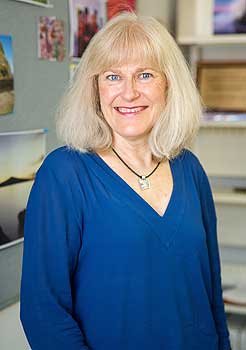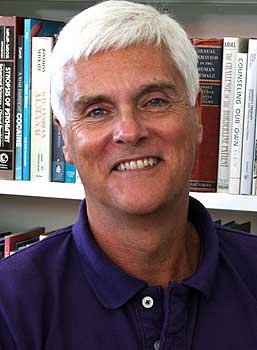
International research shows education can help staff in aged care facilities become more open and supportive in their attitudes and beliefs towards older people expressing their sexuality in long-term care.
A pilot study exploring attitudes to sexuality in aged residential care facilities highlights the need for better understanding of the intimacy needs of the elderly.
Lead researcher Associate Professor Mark Henrickson, from the School of Social Work, and School of Nursing senior lecturer Dr Catherine Cook hope to extend their study, which demonstrated that a significant number of staff, families and residents are managing complex situations without clear processes to protect residents’ rights and safety.
The feasibility study was carried out at a single residential facility in an urban area, as a pre-cursor to a large national study, pending research funding.
Dr Cook says with little or no education or guidelines in place, nursing and other staff generally use their own judgment, usually based on their own moral code rather than focusing on residents’ sexual rights.
“They are managing the situation as best they can, but when dilemmas become complex, staff don’t know what to do. Intimacy and sexuality in aged care is complicated. You have, for example, the issue of cognitive decline, and trying to work out if a person is able to make their own intimacy decisions, and if not, who should be making them for them?

Dr Catherine Cook from the School of Nursing.
“Adult children, although often excellent advocates for their ageing parents in all other respects, may be very unsettled with sexuality-related issues. Residential aged care facilities are people’s homes and yet there is a lack of true privacy in many facilities. This lack of privacy means that behaviours, such as masturbation may be readily interpreted by staff as inappropriate, because staff may lose sight of the understanding that this is a person’s home,” Dr Cook says.
“Adult children may be embarrassed about a parent’s long-standing preferences of which they had no previous knowledge, such as cross-dressing. Adult children may insist staff put a stop to behaviours they deem ‘deviant’, and staff are torn with uncertainties, trying to juggle families’ wishes and residents’ rights, wellbeing and dignity.”
Dr Henrickson says this is not a theoretical issue. “There was much publicity about a case in Iowa in the USA last year which went to trial because a husband was accused of being sexually intimate with his wife, who was living with dementia in a residential facility, and residence staff were concerned about her ability to consent.
“What we also know from listening to facility staff around the country is that many facilities are now enabling access to sex workers for some of their residents, although no one is willing to talk about this openly. There remains a great deal of secrecy and shame about issues of intimacy and sexuality, although they are essential aspects of every person’s life, regardless of how young or old they are,” Dr Henrickson says.

Lead researcher Associate Professor Mark Henrickson from the School of Social Work.
Changing attitudes and beliefs
International research shows education can help staff become more open and supportive in their attitudes and beliefs towards older people expressing their sexuality in long-term care, Dr Cook says.
“Nurses are dealing with these situations as admirably as they can, given they are often challenging. But it’s ad-hoc, with no research-based framework or specific training. It often leans towards a ‘paternalistic’ rather than permissive approach when it comes to residents’ sex lives, focusing more on risk than wellbeing,” Dr Cook says.
“Nationally and internationally it has been noted that sexual minorities - gay, lesbian, bisexual and transgendered people - make up an ‘invisible minority’ in aged care facilities. This increases the likelihood of loneliness that characterises the lives of many people living in aged care. You have people who have been widowed, finally admitting they were gay all along, and it doesn’t always work out smoothly with family members.”
She says the issue of ageism is also evident. “Sexuality is very much linked to youth and beauty. Popular media has a growing number of representations of beautiful older people being sexually active and intimate; those who have retained youthful attributes.
“What about those whose bodies have changed in appearance and whose minds have aged, but they may still have the same sexual desires, and shouldn’t be marginalised because of that.”
Dr Cook says one study participant talked about two residents living with dementia, both in their late 80s, who had found intimate companionship. “The woman had been widowed, and her daughter just wanted to make sure her mother and the elderly man were happy and safe. And they were finding great happiness with each other. It was lovely.
“Sadly, in another case, one woman felt any relationship was not possible due to a lack of privacy and unpredictable intrusions from staff and other residents.”
Dr Cook says nurses would benefit from education to resist common societal practices of mocking older people’s sexuality needs, or seeing them as “cute in an infantilising way”.
“Birthday cards for the over-forties vividly show these stereotypes. Try to understand what life would be like to be touched only when being assisted with toileting, or being weighed or washed.
“International literature indicates what is needed is a systematic approach at an organisational level, and a clinical level, so that there’s a singular approach, based on legal and ethical principles, rather than the moral compass of individual staff. We need to develop flexible policies, in keeping with legislation, and staff need education about the impact of ageism, and on the perception of intimacy and sexuality in aged care,” Dr Cook says.
More needs to be done
Dr Henrickson agrees. “We need not only to develop flexible policies, but we also need to ensure staff are trained regularly about these policies. Some of this is already happening, but much more is required. What we don’t have is a New Zealand research base to develop policies and practices, so we are reliant on information from other countries with quite different populations.”
“We also need to prepare for the future, as the current generation of parents ages into care. The ‘Internet generation’ has very different ideas about sexuality and intimacy from those of their parents, and their children will have different ideas again. Policies and practices need to be revisited on a regular basis to ensure that we are responsive to different generations and communities,” Dr Henrickson adds.
Dr Cook says we could learn a lot from some facilities in countries like America, Canada and Scandinavia, where intimacy and sexuality issues are addressed proactively. “The Hebrew Home in Riverdale, New York, has a Sexual Rights policy. Staff provide a brochure discussing these issues, and talk openly about sexuality with potential residents and their families even before they move on site. The whole process is transparent, making it smoother for everyone to navigate, protecting people’s rights and safety.”
Massey University is hosting a symposium on Intimacy and Sexuality in Aged Care at the Auckland campus in April 2017. The symposium is for nurses, social workers, physicians, occupational and diversional therapists, attorneys, managers, caregivers, psychologists, pastors and others working in aged and/or dementia care, and the rights of residents and patients in care.
Joy Solomon, Esq. director and managing attorney at the Weinberg Center for Elder Abuse Prevention at the Hebrew Home at Riverdale in New York, United States is the keynote speaker.